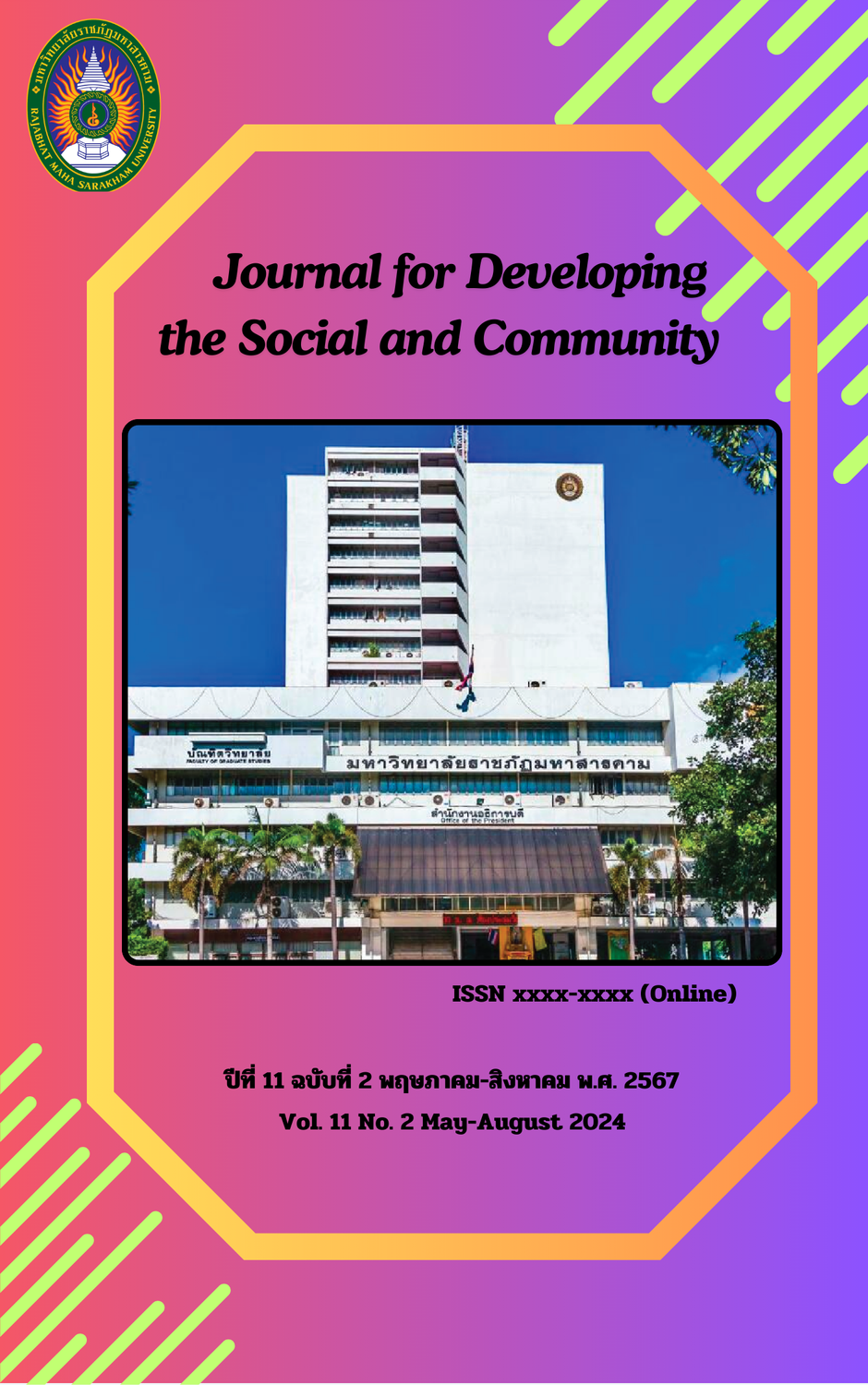Development of Blended Problem-Based Learning to Enhance Problem-Solving Ability and Academic Achievement of Undergraduate Students
Keywords:
Academic achievement, Problem-based learning Enhance, Problem-Solving AbilityAbstract
The objectives of this study were: A blended learning management system incorporating problem-based learning was planned to be built with the aim of achieving effectiveness based on the 80/80 criterion. A comparison was to be made between the academic accomplishment and problem-solving abilities of undergraduate students. Following the completion of a blended problem-based lesson, it was anticipated that the results would surpass the 80% benchmark. The objective of the study was to assess the level of satisfaction among students with a blended, problem-based teaching style in the Energy Technology Course of the undergraduate curriculum.
The research sample consisted of undergraduate students from Maha Sarakham Rajabhat University, namely those enrolled in the 2nd semester of the academic year 2020. 30 individuals were acquired via cluster random sampling. The research utilized the following tools: The equipment utilized in the experiment: A 7-hour problem-based blended learning approach was created. Methods employed for data collection:
A problem-solving aptitude assessment was developed, comprising of 20 multiple-choice questions with four answer choices each. A 60-item multiple-choice test was created to assess intellectual achievement. The statistical measures employed in data analysis encompassed percentage, mean, standard deviation, and one-sample t-test. The findings of the research were as follows: The effectiveness of the problem-based blended learning management was assessed to be 80.22 out of 89.61. The study revealed that academic success exceeded the 80 percent threshold with statistical significance at the .05 level.The students' problem-solving abilities were found to be significantly above the 80 percent threshold, with statistical significance at the .05 level. A mean score of 25.20 points was attained, representing 84 percent.
Student satisfaction with problem-based blended learning was found to be extremely high. The computed mean is 4.91, with a standard deviation of 0.31.
References
Boonsong, W. (2019). Comparison of Learning Achievement of Undergraduate Students in SS 2202304 History of Americas between Learning through WebQuest and Lecture-based Learning. Journal of Rangsit University: Teaching & Learning, 13(1), 100-112.
Boud, D. and Feletti, G. (1998). The Challenge of Problem-based Learning. London : Psychology Press.
Branch, R.M. (2009). Instructional Design: The ADDIE Approach. New York : Springer
Bunyanurak, P. et al. (2001). Problem-based learning. Bangkok: Thana Press and Graphics.
ChartKlomim, K. (2017). HOW TO LEARN PROBLEM BASED LEARNING: COURSED DESIGN AND DEVELOPMENT COURSED FOR STUDENTS’ TEACHERS. Journal of Graduate Studies Valaya Alongkron Rajabhat University, (11)2, 180-192.
Chumdecha, P. (2008). Comparison of academic achievement, analytical thinking ability, and attitude in construction drafting class 1 on the use of computers in design between organizing learning activities in the CIPPA format and learning using drawings. The problem is the foundation of the 1st year of the Diploma of Higher Education. Master of Education thesis. (Curriculum and teaching). Maha Sarakham : Sarakham University.
Jinjo, S. (2007). Development of a blended academic teaching model. Bangkok: King Mongkut's University of Technology North Bangkok.
Khanthakhet, T. et al. (2015). The Development of a Blended Learning Model Emphasizing on Information and Communication Technology Literacy Characteristic for Undergraduate. Social Sciences Research and Academic Journal, (10)29: 29-42.
Nachairit, D. (2017). Development of a model for organizing integrated learning activities based on life skills principles to obtain desirable graduate characteristics of Faculty of Education students. Bangkok : Silpakorn University.
Panich, V. (2013). Creating learning for the 21st century. Bangkok: Siam Commercial Bank Foundation Printing House.
Pengsuk, A. (2021). Developing problem-solving skills of teaching students using simulation situations. Research funding from the national budget. Fiscal year 2021. Research report. Bangkok : Bunditpatanasilpa Institute.
Phumi, W. (2012). Results of learning management. Using problem-based learning (Problem-based Learning), ratios and percentages that affect the ability to solve mathematical problems. and the ability to reason mathematically. Bangkok : Srinakharinwirot University.
Pliwthaisong, P. (2014). Automatic object sorting machine along a conveyor belt. Rajamangala University of Technology Tawan-ok Research Journal, 7 (1) ,88-96.
Saenboonsong, S. & Sintanakul, K.. (2017). The Development of Blended Learning Model on Competency-based by Using MIAP Method of Undergraduate Students. Technical Education Journal King Mongkut’s University of Technology North Bangkok, 8(2), 37–46.
Suvarnaphaet, S & Satiman, A. (2015). The development of the blended learning model using problem-based learning and inquiry-based learning to enhance physics expectation of undergraduate students. E-Journal Silpakorn University, 8(2), 207-221
Downloads
Published
How to Cite
Issue
Section
License
Copyright (c) 2024 Journal for Developing the Social and Community

This work is licensed under a Creative Commons Attribution-NonCommercial-NoDerivatives 4.0 International License.
Articles that are published are copyrighted by the authors of the articles







